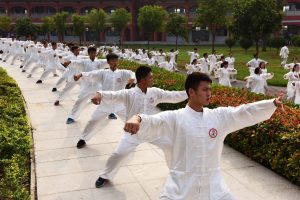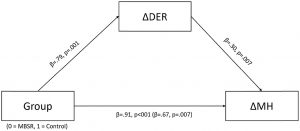
Improve Cognitive and Socio-Emotional Skills in Children with Mindfulness
By John M. de Castro, Ph.D.
“Teaching mindfulness to kids can also help shape three critical skills developed in early childhood: paying attention and remembering information, shifting back and forth between tasks, and behaving appropriately with others.” – Christopher Willard
Childhood is a miraculous period during which the child is dynamically absorbing information from every aspect of its environment. This is particularly evident during the elementary school years. Mindfulness training in school has been shown to have very positive effects. These include improvements in the cognitive, psychological, emotional and social domains. Importantly, mindfulness training in school appears to improve attentional ability which is fundamental to success in all aspects of academic performance. The research evidence has been accumulating. So, there is a need to summarize what has been learned.
In today’s Research News article “Exploring the Effects of Meditation Techniques Used by Mindfulness-Based Programs on the Cognitive, Social-Emotional, and Academic Skills of Children: A Systematic Review.” (See summary below or view the full text of the study at: https://www.frontiersin.org/articles/10.3389/fpsyg.2021.660650/full?utm_source=F-AAE&utm_medium=EMLF&utm_campaign=MRK_1778822_a0P58000000G0YfEAK_Psycho_20211123_arts_A ) Filipe and colleagues review and summarize the published controlled research studies on the effects of mindfulness training on 6-12 year old children. They found 29 published research articles.
They report that the published research found that mindfulness training produced significant improvements in the children’s cognitive skills, including overall executive functions, attention, concentration, inhibitory control, cognitive flexibility, and immediate auditory-verbal memory. They also found that there were significant improvements in socio-emotional skills, including stress, wellbeing, mindfulness, self-esteem, resilience, psychological happiness, empathy, perspective-taking, emotional control, optimism, depression, internalizing problems, peer aggression, prosocial behavior, peer acceptance, anxiety, self-control, self-regulation, mental health problems, quality of life, self-compassion, acceptance, relaxation, happiness, aggressive behaviors, and social competence. But only one of the 29 studies reported improvements in academic skills.
The published research makes a strong case for the effectiveness of mindfulness training to improve the cognitive and socio-emotional skills on children. But there is little evidence for improvement in academic performance. Unfortunately, only 9 of the 29 studies employed strong research designs (randomized controlled trails). So, there is a need for further research with high quality research designs. Nevertheless, the consistency and magnitude of the findings suggest robust positive effects of mindfulness trainings on a myriad of cognitive, social, and emotional skills in children. These are important benefits for these developing humans that may have important contributions to their growth and well-being, perhaps eventually making them better adults. As such, mindfulness training should be incorporated into the school curriculum.
So, improve cognitive and socio-emotional skills in children with mindfulness.
“For children, mindfulness can offer relief from whatever difficulties they might be encountering in life. It also gives them the beauty of being in the present moment.” – Annaka Harris
CMCS – Center for Mindfulness and Contemplative Studies
This and other Contemplative Studies posts are available on Twitter @MindfulResearch
Study Summary
Filipe MG, Magalhães S, Veloso AS, Costa AF, Ribeiro L, Araújo P, Castro SL and Limpo T (2021) Exploring the Effects of Meditation Techniques Used by Mindfulness-Based Programs on the Cognitive, Social-Emotional, and Academic Skills of Children: A Systematic Review. Front. Psychol. 12:660650. doi: 10.3389/fpsyg.2021.660650
There is evidence for the positive impact of mindfulness in children. However, little is known about the techniques through which mindfulness practice results in differential outcomes. Therefore, this study intended to systematically review the available evidence about the efficacy of meditation techniques used by mindfulness-based programs on cognitive, socio-emotional, and academic skills of children from 6 to 12 years of age. The review was registered on the PROSPERO database, and the literature search was conducted according to PICO criteria and PRISMA guidelines. The EBSCO databases were searched, and 29 studies were eligible: nine randomized controlled trials and 20 quasi-experimental studies. All the included randomized controlled trials were rated as having a high risk of bias. Overall, the evidence for mindfulness techniques improving cognitive and socio-emotional skills was reasonably strong. Specifically, for cognitive skills, results showed that all the interventions used “body-centered meditations” and “mindful observations.” Regarding socio-emotional skills, although all the studies applied “body-centered meditations” and “mindful observations,” “affect-centered meditations” were also frequent. For academic skills, just one quasi-experimental trial found improvements, thus making it difficult to draw conclusions. Further research is crucial to evaluate the unique effects of different meditation techniques on the cognitive, social-emotional, and academic skills of children.
https://www.frontiersin.org/articles/10.3389/fpsyg.2021.660650/full?utm_source=F-AAE&utm_medium=EMLF&utm_campaign=MRK_1778822_a0P58000000G0YfEAK_Psycho_20211123_arts_A









